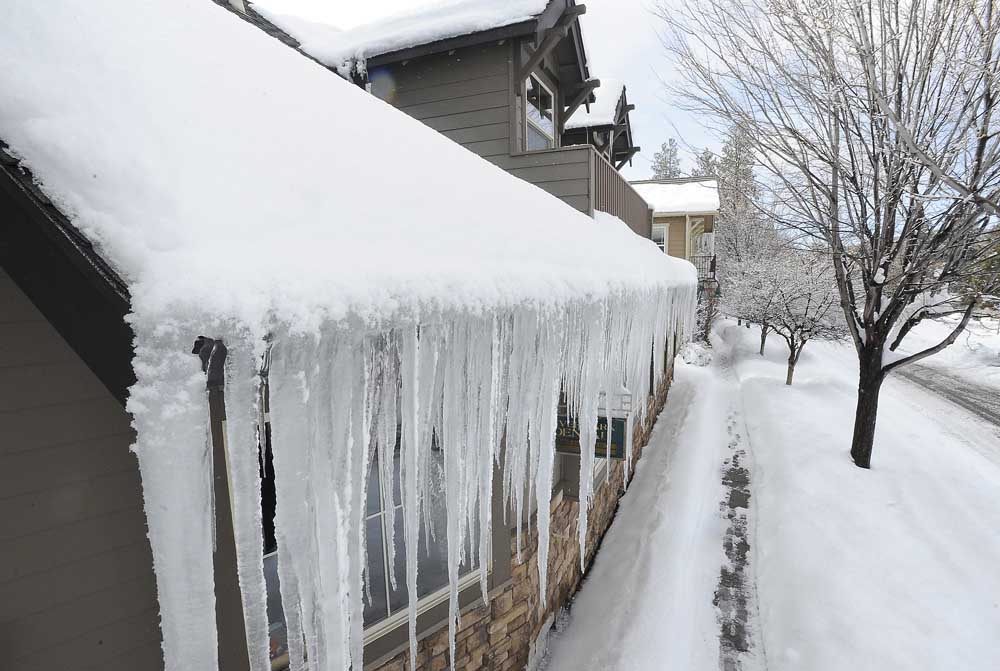Single-digit temps are headed to Central Oregon. Here’s how to protect your pipes from freezing
Published 6:30 am Monday, February 10, 2025

- In this 2019 file photo, icicles hang from a building along SW Shevlin Hixon Drive in Bend.
Burst pipes due to freezing weather can cause flooding and expensive repair bills.
Problems related to frozen pipes can be avoided with a few simple steps, experts say.
Bend and other areas of Central Oregon are forecast to experience single-digit temperatures this week.
Brandon Lawhorn, lead meteologist for the National Weather Service office in Pendleton, said Bend will see a low of 9 degrees in the early morning Tuesday, with a high of 22 degrees. Wednesday is forecast to be the coldest day of the week, with morning lows of 2 degrees in Redmond and Prineville and 3 degrees in Bend. Weather patterns will change later in the week with snow expected in Bend on Thursday.
For those who have already winterized their homes, now is a good time to re-check outdoor faucets and insulation. Making routine checks is easier when snow is fresh.
Home protection tips:
• Ensure outdoor faucets and water outlets are covered. Foam insulation covers can be purchased at any hardware store.
• Remove snow from natural gas and propane shut-offs. Create access to other utilities around the homes.
• Clear snow away from any fire hydrants near your home.
The Bend Fire Department also asks the public to clear sidewalks, driveways, vehicles and any access to utilities. Access to pets and farm animals should also be ensured. Keeping areas clear will help emergency vehicles reach those in need.
Neighbors and family members with mobility challenges may need assistance.
The fire department reminds business owners to protect pipes from freezing. Frozen pipes and indoor sprinkler systems cannot protect buildings in case of fire. A building’s fire sprinkler service company should be contacted to schedule service if it is overdue.
Avion Water Co. recommends keeping the water utility box near the street covered in snow during cold weather events because snow acts as an insulator and will help to prevent pipes from freezing. Snow can also be left on top of irrigation boxes.
When the temperature drops
Homes and businesses can further protect property during extreme cold weather events by taking a few simple steps.
• Keep thermostats set to 70 degrees overnight and open up cabinets under sinks to allow warm air to circulate near pipes.
• Turn on the faucet just a little bit so that a trickle of water comes out of the faucet. Moving water doesn’t freeze as easily. This wastes a little bit of water, but it’s one of the best ways to prevent pipes from freezing.
• Portable space heaters can also be used to warm the space under sinks but leave 3 feet of clearance to prevent fire.
For those leaving town for a while, water can be closed at the main water shut-off. After doing this, open up the faucets and allow water to drain from pipes.
How do you know your pipes may be frozen? An open faucet that produces a slow trickle or no water is a sign the pipe is frozen. You may also detect a foul smell from the drain or faucet. Whistling or banging sounds from pipes are also signs they are frozen.
If pipes do freeze, call a plumber or try to thaw them with heating tape, a space heater or a hair dryer.
The fire department also reminded the public to ensure smoke detectors are working properly. In winter, when windows are closed, smoke and carbon dioxide can build up more quickly in the event of a fire, which means less time to escape if it becomes necessary.








